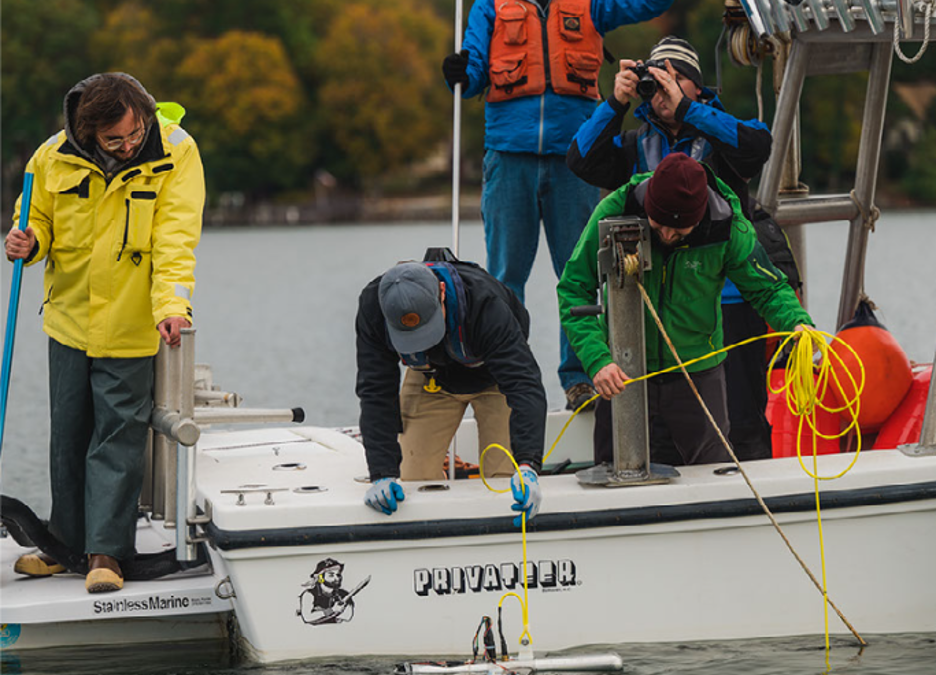Based at the Coastal Studies Institute, the North Carolina Renewable Ocean Energy Program (NCROEP) seeks to use renewable ocean energy wisely and effectively while contributing to North Carolina’s Blue Economy. As a result, NCROEP helps to support interdisciplinary researchers within the UNC System and their projects to advance marine energy solutions. One such example is an underwater energy harvesting kite being developed by researchers at NC State and East Carolina Universities.
After successful tow testing in the NCSU pool in Spring 2021, members of the NCSU Underwater Kite Consortium (led by Dr. Chris Vermillion’s Control and Optimization for Renewables and Energy Efficiency (CORE) Lab) ventured to North Carolina’s Lake Norman last Fall to further test their one-tenth scale underwater energy harvesting kite. The consortium team was supported by the labs of Drs. Matthew Bryant, Kenneth Granlund, and Andre Mazzoleni, as well as CSI’s Oceanography and Marine Hydrokinetic Energy Ocean Lab led by Dr. Mike Muglia. Through the testing at the lake, the team was excited to validate the performance of the kite and corresponding control system over much larger runs than are possible in the NCSU pool, this time while being towed by a boat in the lake.
“So, how does the kite generate energy?”, one may ask. By flying the kite in a figure-eight pattern, the underwater kite can achieve velocities during a cross-current flight that far exceed the speed of the current. During this cross-current flight, the attached cable experiences high tensions that far exceed the tensions seen under stationary operation. The mechanical work done by spooling out a tether under these high tensions is converted into electrical energy by a generator. When the cable is under less tension, the cable recoils, and a much more limited amount of energy is used to keep the kite on its track; the ultimate result, however, is net-positive power production.

Photo: Members of the Lake Norman testing team deployed the kite from the side of the boat before each test. Once the kite was in the water, the boat went underway and kept a steady speed to simulate a flowing water current.
The underwater energy harvesting kite still has a long road ahead before it can be used for grid-scale purposes; however, it has gained significant attention as a viable renewable energy solution for near-term blue economy applications. For one, the power generated by the kite is significantly higher than that generated by a comparable stationary energy harvesting system such as a fixed underwater turbine. Furthermore, because of its dynamic design, the kite system may also be utilized in spaces where other renewable energy devices cannot.
This latest round of testing Lake Norman provided validation for the model and is a significant step in the process of creating a full-scale kite system. The project as a whole, if successful, will be a huge step for the blue economy and the future of renewable energy technologies. The two lab groups have more testing planned this winter, spring, and next fall.



 Based at the Coastal Studies Institute (CSI), the North Carolina Renewable Ocean Energy Program (NCROEP) advances inter-disciplinary marine energy solutions across UNC System partner colleges of engineering at NC State University, UNC Charlotte, and NC A&T University. Click on the links below for more information.
Based at the Coastal Studies Institute (CSI), the North Carolina Renewable Ocean Energy Program (NCROEP) advances inter-disciplinary marine energy solutions across UNC System partner colleges of engineering at NC State University, UNC Charlotte, and NC A&T University. Click on the links below for more information. ECU's Integrated Coastal Programs (ECU ICP) is a leader in coastal and marine research, education, and engagement. ECU ICP includes the Coastal Studies Institute, ECU's Department of Coastal Studies, and ECU Diving and Water Safety.
ECU's Integrated Coastal Programs (ECU ICP) is a leader in coastal and marine research, education, and engagement. ECU ICP includes the Coastal Studies Institute, ECU's Department of Coastal Studies, and ECU Diving and Water Safety. The ECU Outer Banks campus is home to the Coastal Studies Institute.
The ECU Outer Banks campus is home to the Coastal Studies Institute.

